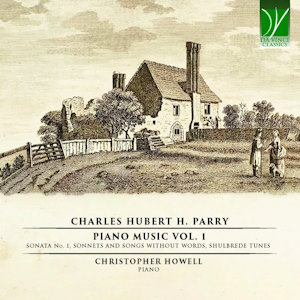
Sir Charles Hubert Parry (1848-1918)
Piano Music Volume 1
Sonata No.1 in F major (pub 1877)
Sonnets and Songs without Words, Book I (1868 pub 1869)
Shulbrede Tunes (1911-13 pub 1914)
Christopher Howell (piano)
rec. 2021, Studio of Griffa e Figli, Milan
Da Vinci Classics C00759 [66]
Though he has recorded much else besides, Christopher Howell has performed particularly valuable work in recording the complete piano music of Stanford and Mackenzie. Now he turns his attention to Parry and a complete edition of his piano works beckons.
Parry has received increasing attention on disc of late and the piano works too have been recorded before – but not all of them, which makes this series that much more valuable. Sonnets and Songs without Words, Book I is an example of a premiere recording in this inaugural volume. You can, however, find Richard Deering’s performance of the Sonata in F minor on Heritage HTGD140-1, a two-disc set with no other overlap with this volume. I think you’ll discover, though, that Howell offers a more crisp and athletic performance without any loss of expression. Parry’s opening movement of this sonata, published in 1877, is fluent and droll, and the scherzo is imbued with plenty of Schumannesque brio. Do I detect the briefest hints of Beethoven’s Op.109 sonata in the slow movement? Maybe or maybe not but Parry certainly knew his Schubert. This is the best of Parry in this otherwise personable but hardly personal work; even in this movement, though, it seems to lack focus in ideas and development. The finale is a generous Old School romp, played with suitable vitesse by Howell.
Book I of The Sonnets and Songs without Words was composed in 1868 when he was only 20. These four little pieces carry enticing titles – A Pastoral, Owlet, Gnome, Lied – that one could confidently expect would draw out Parry’s sense of caprice. Perhaps they don’t quite manage to entice that much but they do offer pleasing examples of his sense of characterisation, though his idea of the pastoral is a bit robust for our sensibilities, perhaps. I like the charming Owlet, all three minutes of it, but I like the Gnome best of all as well as the touching Lied. Hardly essential examples of Parry’s art, it’s nevertheless valuable that they’re here, allowing us to contextualise them in his early musical development.
The final work is the one that has come in for the most recordings of late, Shulbrede Tunes, composed between 1911-13 and published the following year. Peter Jacobs on another Heritage disc (HTGD160), Duncan Honeybourne on EM Records (EMRCD07071) and Simon Callaghan on Rodepomp (RPGMA0073) have all recorded it. In Jacobs’s case it’s on an all-Parry disc that includes the Theme and Nineteen Variations in D minor and Hands Across the Centuries though the other two pianists include it in mixed recitals, not directly comparable to Howell’s venture. Inspired by Parry’s visits to the priory of the same name where his daughter and grandchildren lived, Shulbrede Tunes offers many elements familiar from his much earlier piano music and is unbuttoned, genial, capricious and frank. In its eagerness – a quality Howell stresses in performance to a greater degree than any other pianist on disc – and unhurried lyric warmth it forms a fine cycle. Look to Howell to bring out its delicacy and refinement as well as its quiet ardour and nobility. He does well especially in the extended and grandly conceived finale, a Passacaglia of English sturdiness but also dancing wit, generating a memorable liveliness and earthy good humour. If this is the English Kinderszenen as some have suggested – and I really don’t think it is – it is nevertheless very attractive and certainly deserves its multiple recordings.
The recording here seems to have been made in a relatively intimate setting but it’s not too dry or too close. The microphone placement has been well judged. Howell plays conspicuously well and has made a fine, varied and rewarding start to his Parry odyssey.
Jonathan Woolf
Help us financially by purchasing from



















